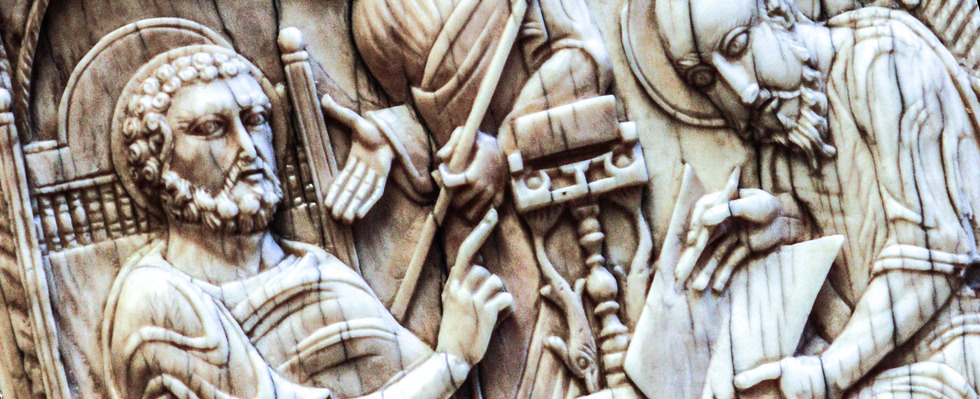Ancient and Modern: The Gospel and Cultures
Michael Nazir Ali FAITH MAGAZINE September-October 2014
The last few weeks I have been closely engaged with the people and scholars of two ancient cultures – that of Egypt and of Mughal India. This has raised afresh for me the question about the relationship of the Gospel to culture.
In Egypt, I found among the students insistent issues being raised about the nature of Egyptian society and the direction which it is taking. There is noticeable interest in Egypt’s Pharaonic and, to a lesser extent, its Christian past. There are musings about Egypt’s contribution to the emergence of monotheism via henotheism (where only one god is worshipped, even if the existence of other gods is not denied) and its possible influence on the Israelites. I was told, again and again, that there was now a movement of atheism in Egypt.
How are Christians to bear witness in this context? Should they see the Gospel as fulfilling themes and motifs in ancient Egypt or as a break from them? Should the old Coptic heritage be emphasised as exemplifying the importance of Christianity for Egypt or should new approaches be developed which express the Gospel in Muslim categories of thought and the use of Islamic terminology, whether orthodox or Sufi? Different answers are given to these questions by clergy, scholars, field-workers and students. Are such approaches at least potentially complementary or are they in conflict and mutually exclusive?
“In such an engagement, the Church and its message is itself ‘contextualised’ but never in a way that diminishes or compromises the Word of God, of which the Church is custodian but not master.”
After returning from Egypt, I went to speak at an academic conference on Islamic India. Apart from my own contribution, and a few others, the emphasis here was, very much on the form of the art, how it was produced, who the artists were and their social context, rather than its message. Much of the literature that was being discussed came from Sufism or Islamic Mysticism but, again, the focus was on how the writings of leading Sufis revealed the kind of society in which they lived and the relationships between Muslims and Hindus. There was a marked reluctance to refer to the spiritual message of these Sufis, the nature of their experiences and of mysticism itself. There was little desire to compare them with mystics of other traditions and times or even to discuss serious debate within Sufism itself.
This alerted me to an aspect of ‘religious illiteracy’ which is so ubiquitous in our society. It is not only politicians and civil servants who display such ‘illiteracy’. It is found at the heart of academia itself and among the very people, historians, social scientists and literary experts, who might be expected to have a special interest in it. And yet, my own paper which overtly discussed theological themes and spiritual subjects was widely welcomed by the audience, if not always by the experts themselves!
The other issue is, of course, that if there is a steadfast refusal to discuss the theological and spiritual dimensions of a subject, how are we to bring the Christian faith to bear on it? An example of this might be the coming anniversary of Magna Carta. If this is seen simply as a struggle between a somewhat venal monarch and aggrieved barons, the Church’s role in promoting basic liberties is completely obscured, as is the significance of Magna Carta for religious freedom in this country.
In our relationship with cultures it seems that a number of factors need to be borne in mind: sometimes (often?) it might be right to follow the wise advice of Pope Gregory the Great to that timid and novice missionary, St Augustine of Canterbury. He should not destroy, says Gregory, but purify the culture through the influence of the Gospel and put it to Christian use (Pope Benedict said much the same regarding the Church’s historic relationship with Hellenism and, in principle, with any culture). Christian missionaries in Mughal India were constantly trying to present the Christian faith not only by writing in Persian (the language of the Court) but also by telling the Christian story, for example, through the painting of miniatures, a notable art form at the time. On the other hand, there is St Boniface, the English apostle to the Germans, who based his missionary approach on challenging and destroying superstition and its hold over people, denying them their God-given freedom.
In fact, the two approaches are complementary and, in every culture, we have to discern what to affirm and what to oppose. Both attitudes are, however, for the sake of transforming the culture so that in Christ it finds its true centre and fulfilment. In such an engagement, the Church and its message is itself ‘contextualised’ but never in a way that diminishes or compromises the Word of God, of which the Church is custodian but not master. Such a properly contextualised church will be at home in a particular culture (although never completely identified with it) but it will also be recognisable as authentically evangelical and catholic by all the other churches and the world-wide Church as a whole.
In a secularised age, therefore, we have to begin one step further back. There is the need, first of all, for people to recognise the spiritual dimension of their study, profession or way of life. Only then can it connect with the Gospel which will both affirm what is godly in a particular culture but also critique and challenge what denies God’s purpose for humanity or for the world which he has created.
Our prayer would be that such an encounter will lead both to the transformation of the culture but also of God’s people within it.
Michael Nazir-Ali is the Emeritus Anglican Bishop of Rochester. He is currently the Director of the Oxford Centre for Training, Research, Advocacy and Dialogue.






